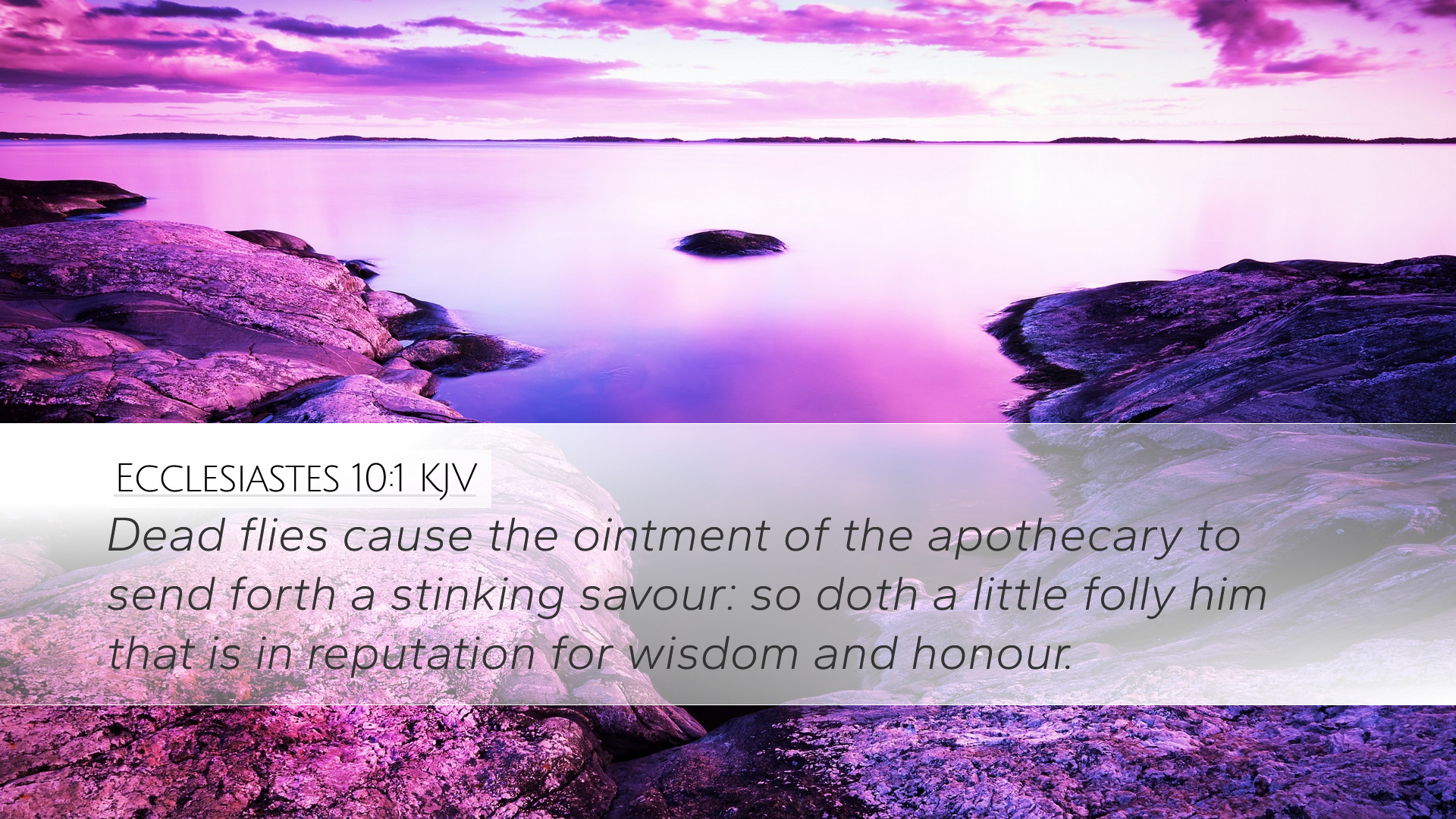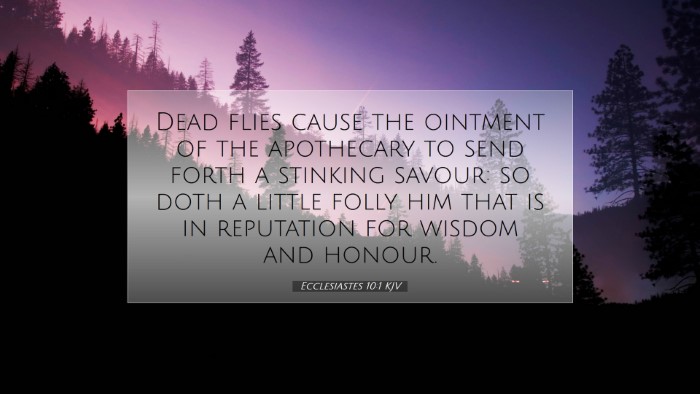Commentary on Ecclesiastes 10:1
Verse: "Dead flies cause the ointment of the apothecary to send forth a stinking savour: so doth a little folly him that is in reputation for wisdom and honour."
Introduction
The verse from Ecclesiastes 10:1 serves as a vivid metaphor illustrating how small imperfections can spoil the reputation of a wise individual. In public domain commentaries, various theologians delve into the implications of this scripture, contemplating its wisdom for both individuals and communities.
General Interpretation
This verse highlights the detrimental effect of folly on a person’s character. The comparison of "dead flies" in precious ointments speaks volumes about how minor flaws can bring about significant consequences.
Matthew Henry's Insight
Matthew Henry emphasizes the value of maintaining one’s reputation. He notes that a person esteemed for wisdom and honour should be particularly cautious, as a single act of folly may overshadow their virtuous characteristics. He implies that even those who possess wisdom can be led astray, suggesting that vigilance is crucial in one's moral and ethical conduct.
Albert Barnes' Commentary
Albert Barnes elaborates on the implications of the metaphor. He states that just as a small quantity of decaying matter can spoil a large amount of good ointment, so can the presence of folly in a wise person's life lead to the degradation of their virtues. Barnes points out that the impact of foolishness is not limited to the individual but can also extend to their associates and community. Thus, the emphasis is placed on the communal responsibility over personal conduct.
Adam Clarke's Analysis
Adam Clarke provides a deeper theological reflection on the text, indicating that the "flies" may symbolize sin or moral failure that corrupts one's reputation. He draws parallels between this degradation and the Christian pursuit of holiness, suggesting that believers must guard against any hint of folly or sin that can tarnish their standing before God and society. Clarke emphasizes the importance of accountability within Christian fellowship to encourage wisdom and prevent downfall.
Theological Significance
The theological implications of Ecclesiastes 10:1 invite significant reflection. This verse touches on the themes of wisdom, integrity, and the ramifications of our choices. It urges scholars and pastors to consider the balance between striving for wisdom and the ever-present danger of folly.
The Nature of Folly
Folly is more than mere foolishness; it can be understood as a moral failing that leads to poor decisions and actions. In both Henry’s and Barnes’ commentary, folly is described as a subtle force that can infiltrate the lives of even the most wise individuals. Awareness of this can lead to proactive measures in personal and community life.
Impact on Reputation
Reputation is often viewed as fragile. The commentary suggests that it only takes a small incident of folly to alter the perception of a wise individual dramatically. This notion resonates strongly within ecclesiastical contexts, where leadership is held to high standards of conduct. Therefore, understanding one's influence is paramount for those in positions of wisdom and authority.
Practical Applications
For pastors, students, theologians, and Bible scholars, this scripture carries vital applications:
-
Self-Examination:
Regular reflection on personal conduct and choices is necessary to identify any 'dead flies' before they can spoil a good reputation.
-
Community Engagement:
Fostering a communal environment where accountability and encouragement promote wisdom enhances collective reputation and moral integrity.
-
Preaching and Teaching:
In teaching contexts, emphasize the importance of wisdom and the risks of folly to inspire congregations toward righteous living.
Conclusion
In conclusion, Ecclesiastes 10:1 serves as a sober reminder of the fragile nature of reputation and the powerful effects of folly. The combined insights from Matthew Henry, Albert Barnes, and Adam Clarke provide a comprehensive perspective on this verse. It inspires believers and leaders to safeguard their wisdom and maintain moral integrity, ensuring that their lives reflect the honor and wisdom they strive to uphold.


